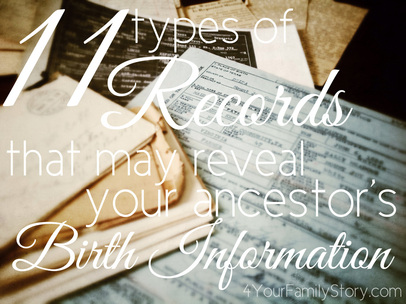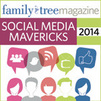 Findmypast Friday (new records!) and Free Weekend!! Findmypast Friday (new records!) and Free Weekend!! Sunday, March 8th, is International Women's Day and here in the United States the month of March is Women's History Month — a perfect time to celebrate the women in your family tree by learning more about them and telling their stories! And a great way of learning about the females in your family tree is by focusing on finding documents that can reveal more about them as well as focusing on documents that reveal clues to help you ferret out their story. Sometimes the clue is that the document puts them in a specific time and place and sometimes it can reveal even more like familial relationships. A document is like a box of chocolates. You just never know what you're gonna get. Every Friday, Findmypast releases new records sets, and to help you find out more about the women in your family tree, according to their press release, they have released "...over 9,500 fascinating UK military records that illustrate the various roles played by woman during the First World War." Take a look:
In addition, Findmypast has released the following records today:
To learn more about each records set as well as how to use it for your research (Kind of important, don't you think? I do.), head over to the Findmypast Friday Page. Also? Findmypast is running an unlimited free access weekend starting today. Snag the details about it on their Free Weekend Page. ~Caroline
0 Comments
A single surname society is one where data and research on a particular surname beyond their own family members with that surname is gathered and published by researchers. These types of societies provide a single surname researcher a place to publish their work and to collaborate with other single surname researchers on that surname. This type of research, of course, can also be a great reference for any type of researcher to use. Below is a press release from a new society for single surnames called The Surname Society. You can join if you are interested in researching single surnames beyond your own family tree and then you can collaborate with others researching the same name. This new single surname society provides collaboration with other researchers around the world using online technology only. Take a look at what they have to offer below in their press release and on their website. Also, you can search their website for your particular surnames and see what research they have published already. They also have an introductory recorded Hangout On Air video on their "About Us" webpage. ~Caroline The founder members are delighted to announce the launch of The Surname Society - the online society for individuals, groups and associations with an interest in surname studies, regardless of their location in the world, the surname they are studying, or their level of research expertise.
Focussing on single surname studies, the society meets the needs of researchers in the world of family history and genealogy as it evolves in the 21st century. The Surname Society’s vision is to connect like-minded people by providing facilities which enable members to share knowledge, data and good practice with others. The society allows members to register both worldwide and limited studies and is entirely online. Collaboration is facilitated and encouraged as it is the core ethos of The Surname Society. Surname researchers collect data relating to all name bearers, either on a global or restricted basis. The society does not mandate study methods and members are encouraged to develop their own approach to the investigation of their surname to advance their knowledge and expertise in areas such as etymology, DNA, name collection and family reconstruction. The Surname Society will help and advise inexperienced members on ways to conduct their study and how to avoid the pitfalls which can occur! A truly global organisation from the outset, the committee members are located around the world from Australia to England, Spain and Canada and in the first week since its announcement to those who completed the online questionnaire, the society has almost one hundred new and enthusiastic members. The cost of membership to The Surname Society is just £5 per annum with no hidden extras. You can register as many names as you want on either a restricted or worldwide basis, collaborate with others, share in the educational opportunities offered and a plethora of resources in the Members’ area of the website including a fascinating quarterly e-newsletter and the School of Surnames, with many other developments in the pipeline in due course. So, what are you waiting for? Take a look at the website and if you are interested, join! For more information visit http://surname-society.org, email [email protected] and/or follow us on Twitter: @surnamesoc Will I find my Annie O'Brien and my O'Brien and Lennon families this weekend?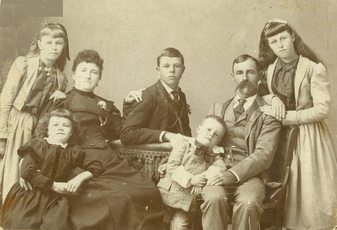 Annie (O'Brien) Vaughan is seated and 3rd from the left. Annie (O'Brien) Vaughan is seated and 3rd from the left. Every Friday, Findmypast releases thousands of new records online. This week's Findmypast Friday release includes wills and probate indexes as well as Thom's Directory, an Irish street directory and almanac, spanning the years 1844-1900. If you have Irish ancestry and have begun researching it (like I have), you know just how difficult it can be with a lack of records. And street directories can help to place your ancestor in a time and place between censuses. And the UK wills and probate records and abstracts can also be very helpful too. Abstracts can reveal spouses, children, etc., and also give you names of witnesses who may or may not have been related. Take a look at what they added:
So, if your roots take you back to Ireland or the UK, you'll want to check out all these new records as well as all of the Findmypast online records since it's a FREE weekend starting today. Plus, if you have roots across the pond, but don't know how to get started, then you're in luck. They have a free live broadcast tomorrow to help you out. And since Thom's Directory is for Dublin and my Annie O'Brien was born there and I've been needing to isolate all the O'Brien's and the Lennon's for this time period *and* since Findmypast is FREE this weekend, I think I'll forego sleep and delve into Findmypast into the wee hours of the weekend. (Time to dig out that old street map of Dublin I found online. Oh, Annie, Henry, James, and Jane...I'm coming for you.) Do you have O'Briens and Lennons in your family tree? Are we related? To read more about my research exploits with Annie et al, visit my personal (and very neglected) Family Stories blog. ~Caroline 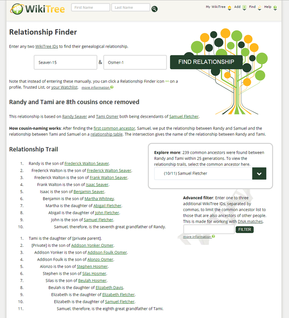 Click on image for a larger view. Click on image for a larger view. This press release was just received from WikiTree. While I have a tree on WikiTree, it's not my main tree, but as I have delved into DNA testing and the myriad of ways to analyze the data, these 2 new DNA tools are going to be very helpful to me. And coming to that conclusion this morning, I logged onto my WikiTree tree and explored their DNA tools and other new-to-me tools early this morning. I added a few more people like siblings, merged some duplicates, looked at a merged ancestor a distant cousin had made for us with a common ancestor, and looked at all the of WikiTree's DNA tools which I had not even looked at before. Then I added all my DNA tests and info to my tree. It takes a while for that information to get processed, I think, but what I found was that the information in general that WikiTree provides about DNA and DNA testing would really help others who have taken DNA tests for genealogy and are lost with their results. They really do a good job of explaining DNA for genealogy and what other DNA tests you need to get and why for confirming your research. The navigation on the site is not as intuitive as I'd like, but if you're willing to click on all the links to find information, then you will be rewarded. So, you have to "play" with it. [But, hey, another weekend is just about here. ;) ] Read their press release below which explains their new DNA tools. ~Caroline FOR IMMEDIATE RELEASE: November 6, 2014
Contact: Eowyn Langholf, [email protected] WikiTree Makes Finding Relationships with DNA Matches Easier 6 November 2014: Today WikiTree.com is announcing two important features for genealogists who have taken DNA tests. These features make WikiTree’s Relationship Finder a uniquely powerful tool for genealogists who have taken 23andMe, AncestryDNA, and FTDNA Family Finder tests. “One of the biggest challenges facing genetic genealogists,” according to Dr. Blaine Bettinger, author of the long-running blog The GeneticGenealogist, “is finding the elusive common ancestor. Finding genetic matches is easy, but finding the common ancestor from whom we inherited a segment DNA is very hard. WikiTree’s new Relationship Finder is a great tool for identifying the ancestors that two or more people share in common.” All Common Ancestors Genealogical relationship finders are generally designed to find the first common ancestor between two people. Genetic genealogists need to know about all the common ancestors they share with a match. Everyone’s family tree intertwines in multiple ways. The first shared ancestor may not be the reason for a shared segment of autosomal DNA. WikiTree’s Relationship Finder now enables you to easily browse all your common ancestors. Filtering for Multiple Matches When a genealogist shares a segment of autosomal DNA with two or more other people who also match each other on that segment, it’s a big clue in discovering which ancestor it came from. WikiTree’s Relationship Finder now enables you to filter the common ancestors shared by two people to only display common ancestors who are also shared by a third, fourth, or fifth person. The Universal Family Tree These Relationship Finder features are possible because WikiTree members are collaborating on a single tree for the entire human family. “The genetic genealogy community absolutely must have a universal family tree,” says leading genetic genealogist Dr. Tim Janzen. “With smaller unlinked trees it's frequently impossible to see all of the true genealogical connections with the people who share autosomal DNA with us. We are finally getting to the point where this vision is becoming a reality at WikiTree.” About WikiTree WikiTree: The Free Family Tree has been growing since 2008. Community members privately collaborate with close family members on modern family history and publicly collaborate with other genealogists on deep ancestry. Since all the private and public profiles are connected on the same system this process is helping to grow a single, worldwide family tree that will eventually connect us all and thereby make it free and easy for anyone to discover their roots. See http://www.WikiTree.com.  The following press release was just received from Findmypast — looks like some free binge researching time this weekend for Veterans Weekend plus a live broadcast to show how to use their records. Read on for all the details: Explore Findmypast’s billions of historical records for FREE this Veterans Weekend
This Veterans Weekend, we want to help everyone find their First World War ancestors and learn more about their family history. So we’re delighted to announce that this Veterans Weekend, we’ll be opening up our archives and giving unlimited free access to billions of records and newspaper pages from all over the world. That means that between 7am on Friday, November 7th and 7am on Monday, November 10th (EST), absolutely everyone will have access to all our historical records, including:
As well as millions of other records that will give everyone the opportunity to explore their family history and bring their past to life. It’s not only new users who will be able to take their family history research further this weekend. Those with current Findmypast Local subscriptions (with an active Britain, Ireland, US & Canada or Australia & New Zealand subscription) will be able to access all our historical World records during the free access weekend. Those with active World subscriptions will have an additional three days added on to their subscription. Find out more at our dedicated Free Weekend page. Live Broadcast This Saturday 8th November, we will be hosting our first ever Live Broadcast. Featuring an expert panel including Findmypast’s Director of Family History, Joshua Taylor, military historian Paul Nixon, and Who Do You Think You Are?’s Lead Genealogist Laura Berry, the broadcast is designed to help everyone get further with their family history research. The talks will cover a wide range of topics – from getting started to breaking down brick walls – and viewers can choose to watch the entire event, or tune in for specific presentations. The Live Broadcast will be shown at http://new.livestream.com/innerear/findmypast at 10am (EST) on Saturday 8th November. All of the presentations can also be watched on demand after the broadcast on the Veterans Weekend section of our blog. See the programme below, and read more about the speakers and their talks on our blog. Live Broadcast Programme
(all times EST) Live Family History Facebook Q&A Directly after our Live Broadcast, we’ll also be hosting a live Q&A on family history researching on our global Facebook page with some of our speakers. Join us between 5.30 and 6.30pm GMT (4.30-5.30am AEDT) to join the discussion on how to get started or break down your family history brick walls. You can submit your questions in advance to our Facebook wall, send them @Findmypast on Twitter using the hashtag #FMPLive, or join us live on Facebook on Saturdayevening. Follow @Findmypast on Twitter and use the hashtag #FMPLive to follow our event updates. For further information please contact: [email protected] About Findmypast Findmypast has been a leading family history website for more than 10 years. It’s a searchable online archive of billions family history records, from parish records and censuses to migration records, military collections, historical newspapers and lots more. For our members around the world, Findmypast is a crucial resource for building family trees and doing detailed historical research. In April 2003 the company was the first to provide access to the complete birth, marriage, and death indexes for England & Wales, winning the Queen’s Award for Innovation. Since that time, Findmypast has digitised family history records from across the globe, including major collections from Britain, Ireland, Australia, and the United States. In partnership with the British Library, Findmypast is part of a project to safeguard the future of the world’s greatest newspaper archive – allowing digital access to more than 40 million newspaper pages. Recently, The National Archives awarded the company the exclusive rights to put the 1939 Register for England and Wales online. www.findmypast.com 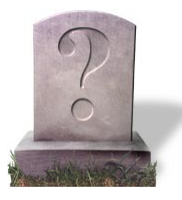 Tomorrow I have the privilege of giving two presentations to the Houston Genealogical Forum down in Houston, Texas. So, I thought I'd share a sneak peek of what I'll be going over. Now, I've given both of these presentations before, but never together. And because they both are technological tools, the presentations had to be updated just a bit. (Because technology changes fast.) However, I'm so glad they picked these two presentations because they kind of go together pretty well. I'm going over Findagrave first and that will naturally lead into what Evernote can do for a family history researcher. I've gone over a few things before with y'all about Findagrave, but I think I can reveal a little more without giving everything in the presentation away. ;) In fact, I think the best thing to go over about Findagrave — in light of the second presentation being Evernote — is all the information you can find by using Findagrave that can help you with solving your family history mysteries. So, here goes... Here are 11 things (clues?) you can find on Findagrave that just might bust that research brick wall to smithereens:
That's quite a bit to find, eh? So much that when you take everything you find there and multiply all of it by the number of people in your family tree, well, you are going to have a lot of "stuff". Digital stuff, but stuff nonetheless to somehow organize and keep straight. And that's where Evernote can be quite handy. In a nutshell, Evernote is a digital storage system that you can access on your mobile device or desktop/laptop anytime and anywhere. And you can store text, images, audio, and video in Evernote. It also has OCR (optical character recognition) capabilities. So... When you take a photo of the label of a bottle of wine that you like so you don't forget the name, Evernote will recognize the text and suddenly that image will be searchable via that text so you can easily find it later when you're out shopping for wine. Whoa, right? Many folks use Evernote to digitally clip things on the web and save in Evernote. Now, before you freak out and ask, "What does 'digitally clip' mean," I'll tell you. Have you ever clipped a coupon out of a newspaper insert? (Please don't ask me what a newspaper is. And, yes, I just totally dated myself. If you truly do not know, Google it.) Well, it's kind of like clipping a coupon out of a newspaper insert. Except you use your mouse and pointer thingy on the screen instead of scissors. (Yes, "thingy" is a technical term.) And you are not really cutting anything, but taking a copy of it. Sorta. Anywho, once it's digitally clipped, you can send it to your Evernote and place it in a digital notebook you've created. Automagically. (Another technical term.) Well, that's just a smidgen of what Evernote is and what it can do, but basically think about all of those things you can find on Findagrave (or on any other place online for that matter). Then think about "clipping" them out and filing them in a digital notebook in Evernote. So, do you have that pictured in your mind? Can you see an image of your ancestor's tombstone? Can you see a copy of it being placed into a notebook? Good. Because that's what it's like. And you know what else it's like? A match made in heaven. Want to learn more about using Evernote for genealogy? Watch this recorded Hangout On Air below. Also, don't forget to grab your Evernote Freebies referenced in the video: Evernote for Genealogy Hangout On Air Freebies This just in from Findmypast — a new partnership with the Wall Street Journal. Read on for all the details.  FINDMYPAST ANNOUNCES MAJOR PARTNERSHIP WITH THE WALL STREET JOURNAL London, UK. 31 October, 2014. Findmypast, the leading British family history company, has announced a major partnership with The Wall Street Journal’s WSJ+ membership programme. Under this new partnership, members of WSJ+ can claim a complimentary three month subscription to findmypast.com as part of their WSJ+ benefits. With a searchable online archive of over 1.8 billion historical records from around the world, including millions of local US and British newspapers, as well an easy-to-use family tree builder, Findmypast is one of the world’s fastest-growing family history websites, both in terms of records and members. It acquired Colorado-based genealogy site mocavo.com in June this year, and is quickly establishing itself as a major player in the competitive US online genealogy market. WSJ+ members will have access to the largest collection of Irish records available online. Alongside extensive passenger lists, and parish records dating back over 1000 years, these records make Findmypast the best place to trace your ancestors and bring your past to life. Juliet Bauer, Chief Commercial Officer at Findmypast, said “This is a great partnership for us. We are very excited to be bringing new customers to family history, and sharing our fantastic record collections with a new US audience. Tracing your family history is addictive and we look forward to giving the members of WSJ+ the chance to explore their past.” About Findmypast Findmypast has been a leading family history website for more than 10 years. It’s a searchable online archive of over 1.8 billion family history records, from parish records and censuses to migration records, military collections, historical newspapers and lots more. For our members around the world, Findmypast is a crucial resource for building family trees and doing detailed historical research. In April 2003 the company was the first to provide access to the complete birth, marriage, and death indexes for England & Wales, winning the Queen’s Award for Innovation. Since that time, Findmypast has digitised family history records from across the globe, including major collections from Britain, Ireland, Australia, and the United States. In partnership with the British Library, Findmypast is part of a project to safeguard the future of the world’s greatest newspaper archive – allowing digital access to more than 40 million newspaper pages. Recently, The National Archives awarded the company the exclusive rights to put the 1939 Register for England and Wales online. For more information please contact [email protected] Take a look at these 11 kinds of records to help you find your ancestor's birth information.
Stuck trying to find birth information about your ancestors? Sometimes birth records can be harder to find than other types of records. Many times, we are looking for our ancestor's birth before registration of births began at the governmental level, but that doesn't mean you can't find clues to your ancestor's birth.
Here are 11 types of records that may include information or clues to find other records about your ancestor's birth:
Sure, some records will be better than others. Meaning that birth information listed on a cemetery record or a death record might not be as credible as baptismal records because generally you'd rather have information from a record created as close as possible to when the birth event occurred. The chances of details of the event being closer to the truth are higher on a record created near the time the event actually occurred. Usually. However, sometimes those older records are not available. So, a good practice is to make a reasonably exhaustive search of all the available records. What types of records have you been able to use for birth information or clues for birth information about your ancestor? ~Caroline
Note: If you are interested in republishing all or part of this blog post in a genealogical society's or genealogy organization's newsletter or journal, please contact me to make arrangements.
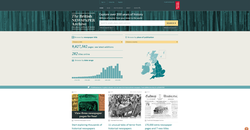 The British Newspaper Archive has now reached 9 million pages. Read the following press release for all the details: The British Newspaper Archive reaches 9 million pages There are now 9 million historical newspaper pages to explore at The British Newspaper Archive (www.britishnewspaperarchive.co.uk) after the website reached a major milestone this week. Product Director Ian Tester commented, ‘We’re thrilled to have reached 9 million pages and have already started chasing the next big milestone. Customers tell us that they’re making amazing discoveries every day, whether they’re researching their family history, the First World War or the history of their local area. Our focus on local titles means that you can find stories from all around the UK and with the recent addition of more Irish titles, we’re becoming a more useful resource all the time’. The British Newspaper Archive has grown massively since it was launched in November 2011. 282 British and Irish newspaper titles are now online, covering 1710-1954. 45 newspaper titles added so far this year Thousands of pages are added every week, so coverage will just keep getting better. More than 2 million pages and 45 new titles have been added to The British Newspaper Archive so far this year, including the Daily Mirror, Daily Record, Dublin Monitor, Lancashire Evening Post, London Evening Standard and Sports Argus. Register for free at www.britishnewspaperarchive.co.uk/account/register to receive monthly updates about what’s being added to the website. Vote for the newspapers you’d like to see online Is there something you’d like The British Newspaper Archive to digitise? You can now suggest titles and vote for other people’s suggestions on the website’s feedback forum: http://help-and-advice.britishnewspaperarchive.co.uk/forums/243704-newspapers-we-should-add-next New collaboration combines family trees and DNA to empower individuals to discover and document their ancestry This just in from MyHeritage: a "strategic collaboration" with 23andMe. You can watch MyHeritage Founder and CEO, Gilad Japhet, break the news live on Bloomberg TV earlier today ( http://youtu.be/c1MefhlGTA8 ): MOUNTAIN VIEW, California & TEL AVIV, Israel - October 21, 2014: 23andMe, the leading personal genetics company, and MyHeritage, the leading destination for discovering, sharing and preserving family history, announced today a strategic collaboration that will provide an enhanced experience for individuals to discover their legacy based on genetic ancestry and documented family history.
23andMe pioneered autosomal DNA ancestry analysis for consumers, and has created the largest DNA ancestry service in the world. With a simple saliva sample 23andMe can reveal the geographic origins of distant ancestors and help people discover unknown relatives. MyHeritage helps millions of families worldwide find and treasure their unique history with easy-to-use family tree tools, a huge library of more than 5.5 billion historical records and innovative matching technologies for automating discoveries. Integrating the market leading solutions in ancestral DNA and family trees will provide an unparalleled experience for customers of both companies. “We believe this collaboration with MyHeritage will offer our customers a vastly improved opportunity to build their family tree and discover new connections,” said Andy Page, President of 23andMe. “Given MyHeritage’s technology leadership in the ancestry space and vast global reach, we are excited about the value this relationship will bring to our customers around the world.” “Combining genealogy with DNA-based ancestry is the next evolution in uncovering family history,” said Gilad Japhet, Founder and CEO of MyHeritage. “DNA testing can connect you to relatives you never knew existed, who descend from shared ancestors centuries ago, but family trees and historical records are critical to map and fully understand these connections. We have great respect for 23andMe’s technology and values, and its pioneering approach to genetics represents strong potential value for our users in the future.” 23andMe will offer its more than three quarters of a million customers around the globe access to MyHeritage’s family tree tools. This will allow 23andMe’s customers to enjoy automated family history discoveries. Smart Matching™ automatically finds connections between user-contributed family trees and Record Matching automatically locates historical records from the billions of records available on MyHeritage, pertaining to any person in the family tree. MyHeritage will utilize 23andMe's API to provide the best experience for customers, by allowing any two people with matching DNA to explore their family tree connections. MyHeritage will also offer 23andMe's Personal Genome Service® to its global community of more than 70 million registered users, in addition to the DNA tests it already offers. The first phase of integration will be complete by early 2015. About 23andMe 23andMe, Inc. is the leading personal genetics company dedicated to helping people access, understand and benefit from the human genome. The company's Personal Genome Service® enables individuals to gain deeper insights into their genetics and ancestry. The vision for 23andMe is to personalize healthcare by making and supporting meaningful discoveries through genetic research. 23andMe, Inc., was founded in 2006, and the company is advised by a group of renowned experts in the fields of human genetics, bioinformatics and computer science. More information is available at www.23andme.com. 23andMe’s health reports are not cleared by the FDA. US customers may purchase 23andMe’s ancestry-only product. Media Contact (Edelman): Jackie Kahn Phone: +1-202-538-0128 Email: [email protected] About MyHeritage MyHeritage is the leading destination for discovering, sharing and preserving family history. As technology thought leaders and innovators in the space, MyHeritage is transforming family history into an activity that’s accessible and instantly rewarding. Trusted by millions of families, its global user community enjoys access to a massive library of historical records, the most internationally diverse collection of family trees and ground-breaking search and matching technologies. MyHeritage empowers families with an easy way to share their story, past and present, and treasure it for generations to come. MyHeritage is available in 40 languages.www.myheritage.com Media contact: Aaron Godfrey Phone: US +1-347-542-7902, UK +44-207-193-2049 Email: [email protected] |
Categories
All
Archives
February 2017
|
|
© Copyright For Your Family Story 2016 - All Rights Reserved
|


